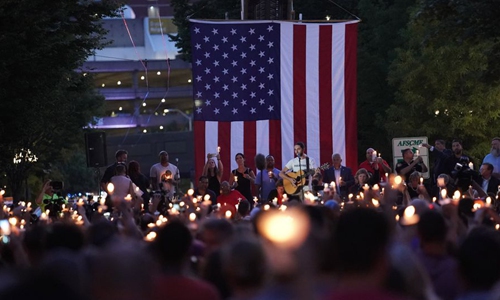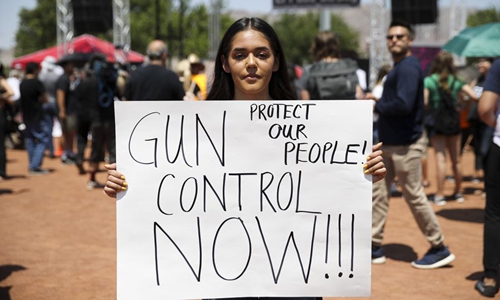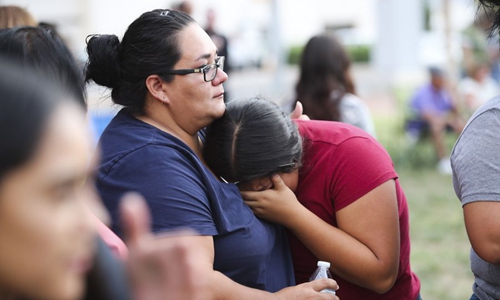HOME >> WORLD
Americans facing mass shooting milestone in 2019 with no progress in gun control
Source:Xinhua Published: 2019/12/23 14:07:53

People attend a vigil to mourn the victims of a mass shooting in Dayton of Ohio, the United States, on Aug. 4, 2019. A gunman wearing body armor shot dead nine people at a popular nightlife area in Dayton. (Xinhua/Liu Jie)
As the final days of the year approach, Americans are facing a grim milestone -- there have already been more mass shootings in 2019 than there are days in the entire year.
As of Sunday, there have been 404 cases of mass shooting in the United States, according to the Gun Violence Archive (GVA), a nonprofit corporation that tracks gun violence across the country. This is the highest number since the organization started collecting data in 2013.
The GVA defines a mass shooting as any incident that results in four or more people being shot, not including the shooter.

College student Jennifer Estrada takes part in a rally for gun control and anti-racism, in El Paso of Texas, the United States, on Aug. 7, 2019. A gunman opened fire at a shopping center in El Paso, killing 22 people and injuring more than two dozen. (Xinhua/Wang Ying)
DEADLY YEAR
According to the GVA, 14,801 people were killed and 28,613 people injured by guns across the United States as of Dec. 22, excluding suicide.
It seems that hardly a day goes by where there's not a mass shooting somewhere in the country. But in reality, it's usually just a few days that typically pass before the next mass shooting. Americans have been dulled by what was once shocking news.
"My personal belief is that we are becoming hardened by the violence and callous patter in mass media," said Gail McConnell, who worked as a prosecutor for 25 years in Texas before retiring.
"The continual hype in any and every event, the callous disregard for life in TV shows, movies, and video games and the increasing isolation allowed by cell phone technology. And the feeling of entitlement," McConnell added.
Residents of the states across the West seem to be more comfortable with a so-called "gun culture."
In the southern state of Texas, generally considered a gun-friendly state, its citizens look suspiciously on gun control laws or any attempt perceived as a move to impinge upon the constitutional right to bear arms.
In the state's Montgomery County, officials have declared the county a "gun sanctuary" county.
County commissioners voted 5-0 during their Nov. 19 session in favor of a resolution that will "maintain citizens' ability to keep and bear arms without the threat of adverse legal ramifications."
With the unanimous passage of the resolution, Montgomery County, with a population of 570,000 people, became the most populous county in Texas to become a gun sanctuary, according to county officials.
Across the country, there are more than 200 counties and 11 cities that have declared themselves as gun sanctuaries, officials said.

People take part in a prayer vigil at Ponder Park in El Paso of Texas, the United States, on Aug. 4, 2019. A gunman opened fire at a shopping center in El Paso, killing 22 people and injuring more than two dozen. (Xinhua/Wang Ying)
HATE CRIME
The deadliest shooting so far in 2019 was in the US-Mexico border town of El Paso, where 22 people were killed and 24 others wounded in a Walmart shooting rampage in early August. The case was being prosecuted as a hate crime.
The shooter posted an anti-immigrant diatribe on an anonymous extremist message board, citing the Christchurch, New Zealand, mosque shooter who left 51 dead in March as an inspiration.
In April, a man who opened fire at a San Diego synagogue also posted a note online that was almost identical to one written by the Christchurch mass murderer.
The note -- full of anti-Semitic language and lauding white supremacy -- named the Christchurch killer and the man accused of fatally shooting 11 people inside a Pittsburgh synagogue in October of 2018 as inspirations for the attack.
Describing the local people's reaction towards the El Paso shooting, William G. Weaver, political science department co-founder and director at the University of Texas at El Paso, said people were "dismayed, sad, somber, and in disbelief" that the massacre happened in the remote and safe city.
"The idea that a person would travel 600 miles (960 km) to kill El Pasoans is what put the city in shock. The idea that a person would carry hatred such a distance to slaughter people in a city because it is overwhelmingly Mexican-American is incomprehensible to the citizens in our isolated and insular city," he continued.
Scholars argue that such hate crime is not a new phenomenon in the US history. However, they noted that there is a growing number of mass shootings that involve hate and hate bias in recent years.
Jon R. Taylor, political science professor and department chair at the University of Texas at San Antonio, believed the social and political reasons for hate crimes vary, "from far-right political and racialist extremism to religious extremism and bias to ethnic prejudice to anti-LGBTQ bias."
His view was echoed by Peter J. Li, associate professor of East Asian politics at University of Houston-Downtown. According to Li, the number of hate crime has increased since 2016 general election.
However, Taylor saw the problem with more complicated roots. He also pointed out that there is only a very small segment of US society that appears more susceptible to extremist rhetoric and acts out on it. Although it's difficult to completely stop it, public vigilance and education can really help to mitigate it.
NO PROGRESS
The nearly daily drumbeat of news reports detailing shootings have stoked emotional and heated debates on how to end the carnage -- from enacting stricter gun laws to banning certain types of weapons. However, little progress has been made in the legislation concerning gun control.
"There is a fairly simple political play at work here. Senate majority leader (Mitch) McConnell will not schedule votes on gun control proposals unless the White House is willing to say the President could endorse them," said Clay Ramsay, a researcher at the University of Maryland.
"Whenever horrific events drive the issue forward, the White House stirs the pot on various partial gun control ideas. When the issue has less attention, the White House withdraws," Ramsay added.
Attorney General William Barr said in November that that efforts in Washington to pass gun legislation in the wake of a spate of deadly mass shootings the past summer have been derailed because of the impeachment proceedings in Congress.
"Right now it does not appear that things in Washington are amenable to those kinds of negotiations and compromises," Barr said at an event in Memphis, Tennessee. "Unfortunately, our discussions on the legislative aspects of this have been sidetracked because of the impeachment process on the Hill, and so we are going forward with all the operational steps that we can take that do not require legislative action."
President Donald Trump and other Republicans have pointed to gun control as one of the key issues where legislation might have been enacted if Democrats weren't pursuing Trump's impeachment.
Chief executives of some of the best-known companies in the United States on Sept. 12 urged Congress in a letter to act on gun violence. The letter came several weeks after two mass shootings, which occurred hours apart in El Paso, Texas, and Dayton, Ohio, took 32 lives in August.
"Doing nothing about America's gun violence crisis is simply unacceptable and it is time to stand with the American public on gun safety," read the letter signed by the heads of 145 US companies, including Airbnb, Twitter, and Uber.
Specifically, they were asking the Senate to pass a bill to "require background checks on all gun sales" and a strong law that "would allow courts to issue life-saving extreme risk protection orders."
"There are steps Congress can, and must, take to prevent and reduce gun violence," read the letter. "We need our lawmakers to support common-sense gun laws that could prevent tragedies like these."
WHAT'S NEXT?
Gun violence costs the United States 229 billion US dollars annually, amounting to 1.4 percent of the country's gross domestic product, according to a newly-released study commissioned by congressional Democrats.
According to Taylor, there are several things that could be done right now to reduce gun violence and still work within the US Constitution's Second Amendment protections of gun ownership rights.
"The first would be so-called 'Red Flag' laws that prevent the mentally ill and convicted violent felons from owning or purchasing guns. While it won't stop all illegal ownership or purchases, it's a start." he said.
Taylor also supports mandatory background checks for all private gun purchases and banning assault-type weapons and personal ownership of bump stocks for these types of weapons.
Republican Senator Lindsey Graham and Democratic Senator Richard Blumenthal are working on a "red-flag" bill, which would permit guns to be removed from people who act as if they are considering conducting an attack or have known mental-health problems. The White House has not got behind any measure presented, said the University of Maryland researcher Clay Ramsay.
Looking into the future, both Taylor and Li predicted there is no quick fix to the gun violence problem. The continual patterns of shootings in the United States have created a high degree of entrenched political polarization between the Republicans and Democrats.
In view of the fact that US Congress is divided with the Democrats controlling the House of Representatives and the Republicans holding the majority in the Senate, there is little chance of a legislative breakthrough in gun legislation, said experts.
With general election coming in 2020, expert expected no positive change in terms of gun violence.
"I would put the chances very low - perhaps 1 in 12," said Ramsay, referring to the possibility of passing any gun-related legislation in the upcoming election year.
"There is a real need to engage in an informed, value-based discussion on gun use and ownership in the US Sadly, that isn't going to happen in an election year and likely won't happen after the presidential election, no matter who wins because the two positions are so politicized that they make it difficult to address the problem of gun-violence in the US," commented Taylor.
Posted in: AMERICAS